- Home
- Holly Black
The Darkest Part of the Forest Page 2
The Darkest Part of the Forest Read online
Page 2
“It’s just kissing.” He grinned at her; his mouth twisted up on one side, and something twisted inside her in response. His smiles and Carter’s smiles were nothing alike. “It’s fun. You’re not hurting anybody. It’s not like you’re stabbing boys just to make something happen around here.”
That surprised a laugh out of her. “Maybe you should tell that to Carter.”
She didn’t explain that she wasn’t so much wanting something to happen as not wanting to be the only one with a secret self to reveal.
Jack draped an arm over her shoulder, pretend-flirting. It was friendly, funny. “He’s my brother, so I can tell you definitively that he’s an idiot. You must amuse yourself however you can among the dull folk of Fairfold.”
She shook her head, smiling, and then turned toward him. He stopped speaking, and she realized how close their faces had become.
Close enough that she could feel the warmth of his breath against her cheek. Close enough to watch the dark fringe of his eyelashes turn gold in the reflected light and to see the soft bow of his mouth.
Hazel’s heart started pounding, her ten-year-old self’s crush coming back with a vengeance. It made her feel just as vulnerable and silly as she’d felt back then. She hated that feeling. She was the one who broke hearts now, not the other way around.
Anyone who offers up their heart on a silver platter deserves what they get.
There was only one way to get over a boy. Only one way that ever worked.
Jack’s gaze was slightly unfocused, his lips slightly apart. It seemed exactly right to close the distance between them, to shut her eyes and press her mouth to his. Warm and gentle, he pressed back for a single shared exchange of breath.
Then he pulled away, blinking. “Hazel, I didn’t mean for you—”
“No,” she said, leaping up, her cheeks hot. He was her friend, her brother’s best friend. He mattered. It would never be okay to kiss him, even if he wanted her to, which he clearly did not, and which made everything much worse. “Of course not. Sorry. Sorry! I told you I shouldn’t go around kissing people, and here I am doing it again.”
She backed away.
“Wait,” he started, reaching to catch her arm, but she didn’t want to stay around while he tried to find the right words to let her down easy.
Hazel fled, passing Carter with her head down, so she didn’t have to see his knowing told-you-so look. She felt stupid and, worse, like she deserved to be rejected. Like it served her right. It was the kind of karmic justice that didn’t usually happen in real life, or at least didn’t usually happen so fast.
Hazel headed straight for Franklin. “Can I have some of that?” she asked him, pointing to the metal flask.
He looked at her blearily through bloodshot eyes but held the flask out. “You won’t like it.”
She didn’t. The moonshine burned all the way down her throat. But she slugged back two more swallows, hoping that she could forget everything that had happened since she’d arrived at the party. Hoping that Jack would never tell Ben what she’d done. Hoping Jack would pretend it hadn’t happened. She just wished she could undo everything, unravel time like yarn from a sweater.
Across the clearing, illuminated by Stephen’s headlights, Tom Mullins, linebacker and general rageaholic, leaped up onto the glass coffin suddenly enough to make the girls hop off. He looked completely wasted, face flushed and hair sticking up with sweat.
“Hey,” he shouted, jumping up and down, stomping like he was trying to crack the glass. “Hey, wakey, wakey, eggs and bakey. Come on, you ancient fuck, get up!”
“Quit it,” said Martin, waving for Tom to get down. “Remember what happened to Lloyd?”
Lloyd was the kind of bad kid who liked to start fires, who carried a knife to school, and who, when teachers were taking attendance, they were hard pressed to remember whether he wasn’t there because he was cutting class or because he was suspended. One night last spring Lloyd took a sledgehammer to the glass coffin. It didn’t shatter, but the next time Lloyd set a fire, he got burned. He was still in a hospital in Philadelphia, where they had to graft skin from his ass onto his face.
Some people said the horned boy had done that to Lloyd, because he didn’t like it when people messed with his coffin. Others said that whoever cursed the horned boy cursed the glass, too. So if anyone tried to break it, that person would bring bad luck on themselves. Though Tom Mullins knew all that, he didn’t seem to care.
Hazel knew just how he felt.
“Get up!” he yelled, kicking and stomping and jumping. “Hey, lazybones, time to waaaaaaake up!”
Carter grabbed his arm. “Tom, come on. We’re going to do shots. You don’t want to miss this.”
Tom looked unsure.
“Come on,” Carter repeated. “Unless you’re too drunk already.”
“Yeah,” said Martin, trying to sound convincing. “Maybe you can’t hold your booze, Tom.”
That did it. Tom scrambled down, lumbering away from the coffin, protesting that he could drink more than the both of them combined.
“So,” Franklin said to Hazel. “Just another dull night in Fairfold, where everyone’s a lunatic or an elf.”
She took one more drink from the silver flask. She was starting to get used to the feeling that her esophagus was on fire. “Pretty much.”
He grinned, red-rimmed eyes dancing. “Want to make out?”
From the look of him, he was as miserable as Hazel was. Franklin, who’d barely spoken for the first three years of grammar school and who everyone was sure ate roadkill for dinner sometimes. Franklin, who wouldn’t thank her if she asked him what was bothering him, since she’d wager he had almost as much to forget as she did.
Hazel felt a little bit light-headed and a lot reckless. “Okay.”
As they walked away from the truck and into the woods, she glanced back at the party in the grove. Jack was watching her with an unreadable expression on his face. She turned away. Passing under an oak tree, Franklin’s hand in hers, Hazel thought she saw the branches shift above her, like fingers, but when she looked again, all she saw were shadows.
CHAPTER 2
The summer when Ben was a baby and Hazel was still in their mother’s belly, their mother went out to a clearing in the woods to paint en plein air. She’d spread out her blanket over the grass and sat Ben, slathered in SPF-50 and gumming a chunk of zwieback, on it while she daubed her canvas with cadmium orange and alizarin crimson. She painted for the better part of an hour before she noticed a woman watching from the cool shadows of the nearby trees.
The woman, Mom said, when she told the story, had her brown hair pulled back in a kerchief and carried a basket of young green apples.
“You’re a true artist,” the woman told her, crouching down and smiling delightedly. That was when Mom noticed her loose dress was hand-loomed and very fine. For a moment Mom thought she was one of those ladies who got into homesteading and canned stuff from her garden, kept chickens, and sewed her own clothes. But then she saw that the woman’s ears rose to slim, delicate points and realized she was one of the Folk of the Air, tricksy and dangerous.
As is the tragedy of so many artists, Mom was more fascinated than afraid.
Mom had grown up in Fairfold, had heard endless stories about the Folk. Had known about the nest of redcaps who dipped their hats in fresh human blood and who were rumored to live near an old cave on the far side of town. She’d heard about a snake-woman sometimes spotted in the cool of the evening near the edges of the woods. She knew of the monster made of dry branches, tree bark, dirt, and moss, who turned the blood of those she touched to sap.
She remembered the song they sang while they skipped rope as girls:
There’s a monster in our wood
She’ll get you if you’re not good
Drag you under leaves and sticks
Punish you for all your tricks
A nest of hair and gnawed bone
You are never, ever com
ing—
They’d shouted it with great glee, never saying the last word. If they had, the monster might have been summoned—that’s what it was supposed to do, after all. But as long as they never finished the song, the magic wouldn’t work.
But not all the stories were terrible. The generosity of the Folk was as great as their cruelty. There was a little girl in Ben’s playgroup whose doll was stolen by a nixie. A week later that same girl woke in her crib with ropes of gorgeous freshwater pearls wound around her neck. That was why Fairfold was special, because it was so close to magic. Dangerous magic, yes, but magic all the same.
Food tasted better in Fairfold, people said, infused as it was with enchantment. Dreams were more vivid. Artists were more inspired and their work more beautiful. People fell more deeply in love, music was more pleasing to the ear, and ideas came more frequently than in other places.
“Let me draw you,” Mom said, pulling her sketchbook from her bag, along with some charcoals. She thought she drew better in Fairfold, too.
The woman demurred. “Draw my beautiful apples instead. They are already given over to rot, while I will remain as I am for all the long years of my life.”
The words sent a shiver down Mom’s spine.
The woman saw her face and laughed. “Oh yes, I have seen the acorn before the tree. I have seen the egg before the hen. And I will see them all again.”
Mom took a deep breath and tried again to persuade her. “If you allow me to draw you, I’ll give you the picture once it’s done.”
The elf woman considered this for a long moment. “I may have it?”
Mom nodded, the woman assented, and Mom got to work. All the while that Mom sketched, they spoke of their lives. The woman said she had once belonged to an easterly court but had followed one of the gentry into exile. She told Mom of her newfound love of the deepness of the forest, but also of her longing for her old life. In turn, Mom told her of her fears about her first child, who’d grown fussy and bored, whimpering on his blanket and in need of a new diaper. Would Ben grow up to be someone completely unlike her, someone who would be uninterested in the arts, someone dull and conventional? Mom’s parents had been disappointed in her again and again because she wasn’t like them. What if she felt that same way about Ben?
When Mom was done with the drawing, the elf woman drew in her breath at the loveliness of it. She knelt down on the blanket beside the baby and brought her thumb to his temple. Immediately, he began to howl.
Mom grabbed for the woman. “What have you done?” she cried. On her son’s brow, a red stain was spreading in the shape of a fingertip.
“For the gift of your drawing, I owe you a boon.” The woman rose, towering above Mom, taller than seemed possible, while Mom wrapped her arms around a squalling Ben. “I can’t change his nature, but I can give him the gift of our music. He will play music so sweet that no one will be able to think of anything else when they hear it, music that contains the magic of faerie. It will weigh on him and it will change him and it will make him an artist, no matter what else he desires. Every child needs a tragedy to become truly interesting. That is my gift to you—he will be compelled to art, love it or no.”
With that, the elf woman took her drawing and left my mother huddled on her blanket, weeping, arms around Ben. She wasn’t sure if her son had been cursed or blessed.
The answer turned out to be both.
But Hazel, floating in the tideless sea of amniotic fluid, was neither. Her tragedy, if she had one, was to be as normal and average as any child ever born.
CHAPTER 3
Hazel got home from the party late that night to find Ben eating cereal at the kitchen table, dragging his spoon through the milk to scoop up the last pieces of granola. It was a little after midnight, but their parents were still awake and still working. Light blazed from the windows of their shared art studio out back. Sometimes, when they were inspired or on deadline, one of them even wound up sleeping out there.
Hazel didn’t mind. She was proud of the ways they were different from other people’s parents; they’d raised her to be. “Normal people,” they’d say with a shudder. “Normal people think they’re happy, but that’s because they’re too dumb to know any different. Better to be miserable and interesting, right, kiddo?” Then they’d laugh. Sometimes, though, when Hazel walked around their studio, breathing in the familiar smells of turpentine and varnish and fresh paint, she wondered what it would be like to have happy, normal, dumb parents, and then she felt guilty for wondering.
Ben looked up at her with cornflower-blue eyes and black brows, like her own. His red hair was messier than usual, the loose curls disheveled. There was a leaf stuck in it.
Hazel moved to pluck it out, grinning. She was drunk enough to feel blurry around the edges, and her mouth was a bit abraded from the way Franklin mashed his lips against hers, all details she wanted to be distracted from. She didn’t want to remember any of the night, not Jack nor how much of an idiot she’d been, not any of it. She pictured a huge trunk slamming down on those memories, a padlock coiling around the trunk, and then the trunk falling to the bottom of the sea. “So how was your date?” she asked him.
He gave a long sigh, then pushed his bowl away, across the worn tablecloth. “Basically awful.”
Hazel put her head down on the table, looking over at him. He seemed insubstantial from that angle, as though if she squinted, she might be able to see right through him. “Was he into something weird? Rubber suits? Clown costumes? Rubber clown costumes?”
“He was not.” Ben didn’t laugh. His smile had gone a bit strained.
Hazel frowned. “Are you okay? Did something—”
“No, not like that.” Ben spoke quickly, shaking off her concern. “We went back to his apartment and his ex was there. As in, his ex still lived there.”
She smothered a gasp, because that did sound awful. “Seriously? He didn’t mention that beforehand?”
“He said he had an ex—full stop. Everyone has an ex! Even me! I mean, you have, what, millions?” He grinned, so she’d know he was kidding.
Hazel wasn’t in the mood for that particular joke. “Can’t have an ex if you never go on a date,” she said.
“Anyway, we go in the door, and this guy is sitting in front of the television looking crushed. Like, clearly, he’s not okay with my being there, and, clearly, he wasn’t prepared for it, either. My date, meanwhile, is talking about how his ex is cool and he’ll even sleep on the couch so we can hang out in the bedroom. Which is how I realize there’s only one bedroom in the apartment. Right then I decide that I have to get out of there. But what am I supposed to do? I feel like I can’t say anything, because that would be rude. Mutually constructed reality, the social contract, something. I just can’t.”
Hazel snorted, but he ignored her.
“So I say I have to go to the bathroom, and I hide in there, trying to get my nerve up. Then, taking a breath, I walk out and just keep going until I’m through the apartment door and down the stairs. When I hit the sidewalk, I book it.”
She laughed, picturing him enacting this less-than-subtle plan. “Because running away isn’t rude at all.”
Ben shook his head solemnly. “Less awkward.”
That made her laugh harder. “Have you checked your e-mail? I mean, he’s going to write and ask where you went. Won’t that be awkward?”
“Are you kidding? I am never going to check my e-mail again,” Ben said, with feeling.
“Good,” said Hazel. “Boys on the Internet lie.”
“All boys lie,” Ben said. “And all girls lie, too. I lie. You lie. Don’t pretend you don’t.”
Hazel didn’t say anything, because he was right. She’d lied. She’d lied a lot, especially to Ben.
“So how about you? How was our prince tonight?” he asked.
Over the years, Hazel and Ben had made up a lot of stories about the horned boy. They’d both drawn endless pictures of his beautiful face and curving hor
ns with Dad’s markers, Mom’s charcoals, and, before that, their own crayons. If Hazel closed her eyes, she could conjure the image of him—his midnight-blue doublet stitched with dark gold thread picking out phoenixes, griffins, and dragons; pale hands folded over each other, each adorned with glittering rings; nails unusually long and subtly pointed; boots of ivory leather that came to his calves; and a face so beautiful, with features so perfectly shaped, that looking at him for too long made you feel as though everything else you saw was unbearably shabby.
He must be a prince. That was what Ben had decided when they first saw him. A prince, like the ones in fairy tales, with curses that could be broken by their true loves. And back then, Hazel was sure she would be the one to wake him.
“Our prince was the same,” Hazel said, not wanting to talk about the night, but not wanting to be obvious about it, either. “Everyone was the same. Everything was the same.”
She knew it wasn’t Ben’s fault that she got frustrated by her life. Her bargains were made. There was no point in regretting them, and even less point in resenting him.
After a while, their dad staggered in from the studio to make a cup of tea and shooed them off to bed. Dad was on deadline, trying to finish up the illustrations he was supposed to drive to the city with on Monday. He was likely to stay up all night, which meant he’d notice if they stayed up, too.
Mom was probably keeping him company. Mom and Dad had started dating in art school in Philadelphia, bound by a love of kids’ books that led to Ben and Hazel both being named, humiliatingly, after famous rabbits. Soon after graduation, Mom and Dad moved back to Fairfold, broke, pregnant, and willing to get married if that meant Dad’s family would let them live rent-free in his great-aunt’s farmhouse. Dad converted the barn behind it into a studio and used his half to paint illustrations for picture books, while Mom used hers to paint landscapes of the Carling forest that she sold in town, mostly to tourists.

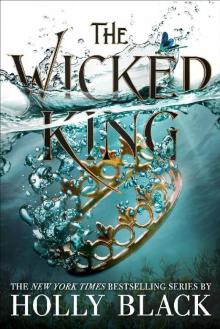 The Wicked King (The Folk of the Air #2)
The Wicked King (The Folk of the Air #2)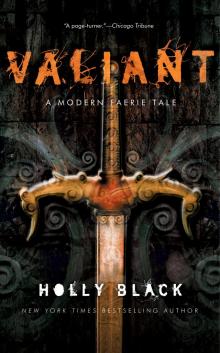 Valiant
Valiant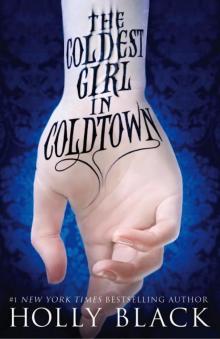 The Coldest Girl in Coldtown
The Coldest Girl in Coldtown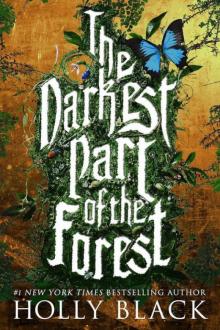 The Darkest Part of the Forest
The Darkest Part of the Forest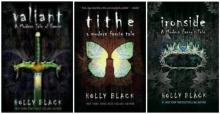 Tithe
Tithe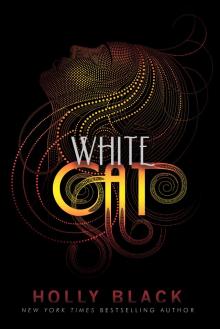 White Cat
White Cat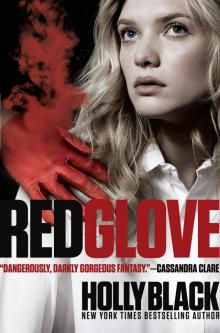 Red Glove
Red Glove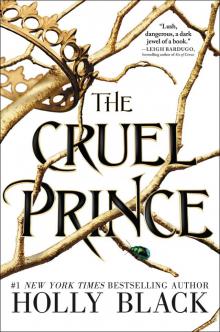 The Cruel Prince
The Cruel Prince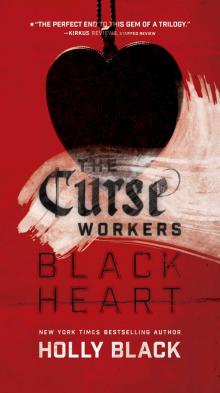 Black Heart
Black Heart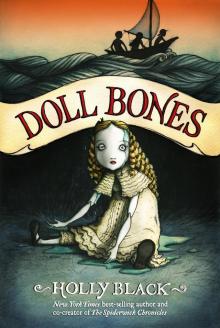 Doll Bones
Doll Bones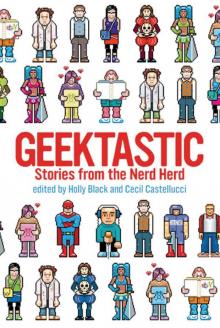 Geektastic: Stories from the Nerd Herd
Geektastic: Stories from the Nerd Herd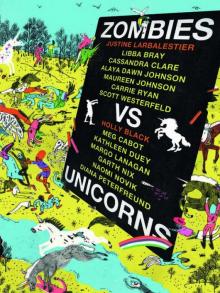 Zombies Vs. Unicorns
Zombies Vs. Unicorns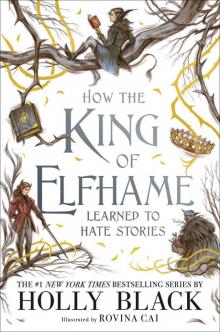 How the King of Elfhame Learned to Hate Stories
How the King of Elfhame Learned to Hate Stories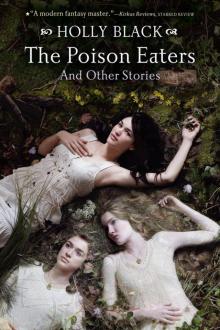 The Poison Eaters and Other Stories
The Poison Eaters and Other Stories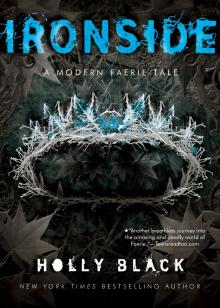 Ironside
Ironside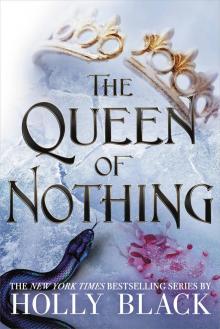 The Queen of Nothing
The Queen of Nothing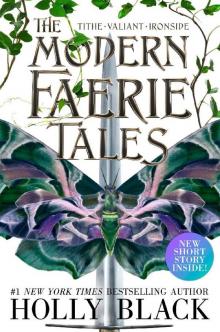 Modern Faerie Tales
Modern Faerie Tales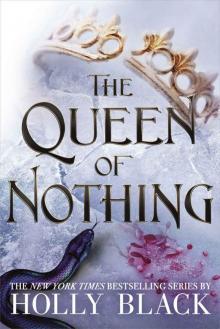 The Queen of Nothing (The Folk of the Air #3)
The Queen of Nothing (The Folk of the Air #3)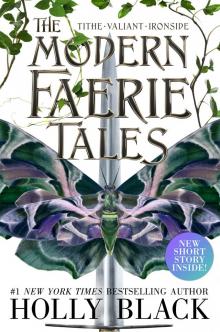 The Modern Faerie Tales
The Modern Faerie Tales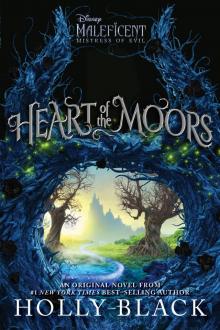 Heart of the Moors
Heart of the Moors The Golden Tower
The Golden Tower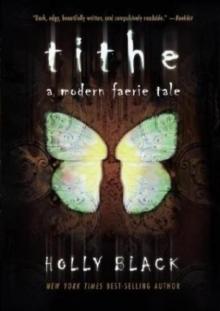 Tithe mtof-1
Tithe mtof-1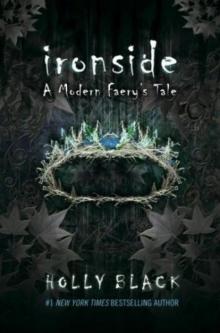 Ironside mtof-3
Ironside mtof-3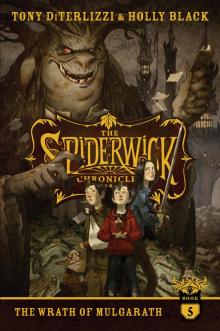 The Wrath of Mulgarath
The Wrath of Mulgarath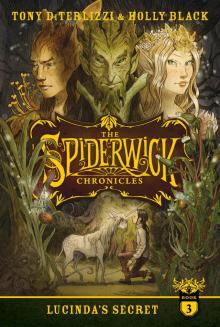 Lucinda's Secret
Lucinda's Secret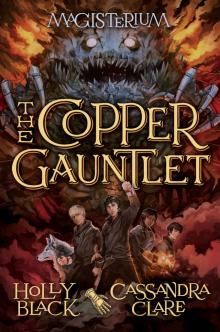 The Copper Gauntlet
The Copper Gauntlet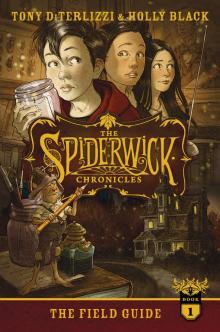 The Field Guide
The Field Guide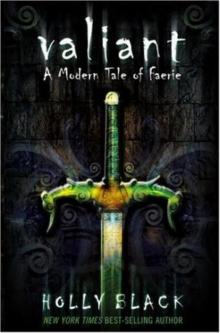 Valiant mtof-2
Valiant mtof-2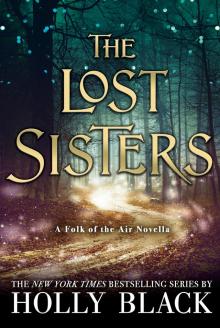 The Lost Sisters
The Lost Sisters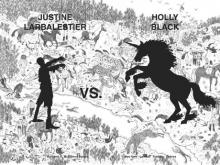 Zombies vs. Unicorns
Zombies vs. Unicorns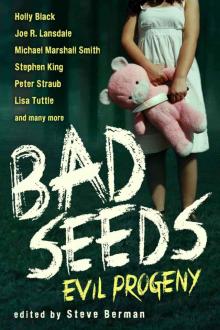 Bad Seeds: Evil Progeny
Bad Seeds: Evil Progeny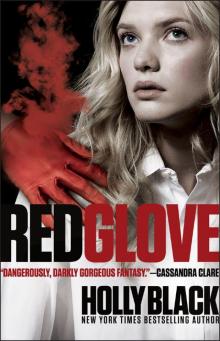 Red Glove (2)
Red Glove (2)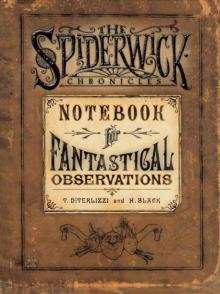 Notebook for Fantastical Observations
Notebook for Fantastical Observations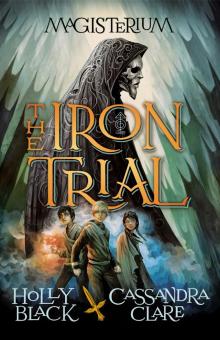 The Iron Trial
The Iron Trial Welcome to Bordertown
Welcome to Bordertown